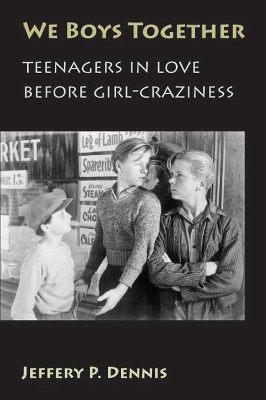
We Boys Together
Teenagers in Love Before Girl-craziness
Seiten
2007
Vanderbilt University Press (Verlag)
978-0-8265-1557-5 (ISBN)
Vanderbilt University Press (Verlag)
978-0-8265-1557-5 (ISBN)
Explores romantic relationships between teenage boys as they were portrayed before, during, and immediately after World War II. This work takes the reader through a landscape of media - sci fi pulps, comics, adventure stories, tales of teen sleuths, boys' serial novels, wartime bestsellers, and movies populated by many types of male adolescents.
Teenage boys are wild about girls. When their hormones kick in at puberty, they can think of nothing else, and that's the way it has always been - right? Wrong. Before World War II, only sissies liked girls. Masculine, red-blooded, all-American boys were supposed to ignore girls until they were 18 or 19. Instead, parents, teachers, psychiatrists, and especially the mass media encouraged them to form passionate, intense, romantic bonds with each other. This book explores romantic relationships between teenage boys as they were portrayed before, during, and immediately after World War II, including - teenage melodramas: ""We'll always be together!""; Adventure Boys: ""I never knew what the treasure was...""; Henry Aldrich: ""Would you mind if I take you out sometime and buy you a milkshake?""; Andy Hardy: ""Hi, tenderfoot, drop by sometime""; Terry and the Pirates: ""I'd feel a lot better if I slept with you tonight""; superhero and sidekick: ""Come on, let's go home""; the Dead End Kids: ""They may be underprivileged, but they sure ain't underdeveloped""; the Little Tough Guys: ""Lots of guys go in pairs""; colonial fantasies: ""Stay away, this is my friend!"" ; the teenage musical: ""If there's a double meaning in that, I got it""; high school yearbooks: ""Tall, dashing, quick, and fair, spurns all girls with vigilant care!"" The author takes the reader through a rich landscape of media - sci fi pulps, comics, adventure stories, tales of teen sleuths, boys' serial novels, wartime bestsellers, and movies populated by many types of male adolescents: ""Boys Next Door"", ""Adventure Boys"", ""Jungle Boys"", and ""Lost Boys"". In Hollywood movies, ""Boys Next Door"" like Jackie Cooper, Ronald Sinclair, and Jimmy Lydon were constantly falling in love, but not with girls. In serial novels, ""Jungle Boys"" like Bomba, Sorak, and Og Son of Fire swung through the trees to rescue teenage boys, not teenage girls. In comic strips and on the radio, ""Adventure Boys"" like Don Study, Jack Armstrong, and Tim Tyler formed lasting romantic partnerships with other boys or men. ""Lost Boys"" like Frankie Darro, Leo Gorcey, and Billy Halop starred in dozens of movies about pairs of poor urban teenagers sticking together, with never a girl in sight.
Teenage boys are wild about girls. When their hormones kick in at puberty, they can think of nothing else, and that's the way it has always been - right? Wrong. Before World War II, only sissies liked girls. Masculine, red-blooded, all-American boys were supposed to ignore girls until they were 18 or 19. Instead, parents, teachers, psychiatrists, and especially the mass media encouraged them to form passionate, intense, romantic bonds with each other. This book explores romantic relationships between teenage boys as they were portrayed before, during, and immediately after World War II, including - teenage melodramas: ""We'll always be together!""; Adventure Boys: ""I never knew what the treasure was...""; Henry Aldrich: ""Would you mind if I take you out sometime and buy you a milkshake?""; Andy Hardy: ""Hi, tenderfoot, drop by sometime""; Terry and the Pirates: ""I'd feel a lot better if I slept with you tonight""; superhero and sidekick: ""Come on, let's go home""; the Dead End Kids: ""They may be underprivileged, but they sure ain't underdeveloped""; the Little Tough Guys: ""Lots of guys go in pairs""; colonial fantasies: ""Stay away, this is my friend!"" ; the teenage musical: ""If there's a double meaning in that, I got it""; high school yearbooks: ""Tall, dashing, quick, and fair, spurns all girls with vigilant care!"" The author takes the reader through a rich landscape of media - sci fi pulps, comics, adventure stories, tales of teen sleuths, boys' serial novels, wartime bestsellers, and movies populated by many types of male adolescents: ""Boys Next Door"", ""Adventure Boys"", ""Jungle Boys"", and ""Lost Boys"". In Hollywood movies, ""Boys Next Door"" like Jackie Cooper, Ronald Sinclair, and Jimmy Lydon were constantly falling in love, but not with girls. In serial novels, ""Jungle Boys"" like Bomba, Sorak, and Og Son of Fire swung through the trees to rescue teenage boys, not teenage girls. In comic strips and on the radio, ""Adventure Boys"" like Don Study, Jack Armstrong, and Tim Tyler formed lasting romantic partnerships with other boys or men. ""Lost Boys"" like Frankie Darro, Leo Gorcey, and Billy Halop starred in dozens of movies about pairs of poor urban teenagers sticking together, with never a girl in sight.
Jeffery P. Dennis, author of Queering Teen Culture, teaches sociology at Wright State University.
| Erscheint lt. Verlag | 30.6.2007 |
|---|---|
| Zusatzinfo | 9 illustrations, reference notes, index |
| Verlagsort | Tennessee |
| Sprache | englisch |
| Maße | 161 x 228 mm |
| Gewicht | 445 g |
| Themenwelt | Geisteswissenschaften ► Psychologie ► Sexualität / Partnerschaft |
| Sozialwissenschaften ► Soziologie ► Gender Studies | |
| Sozialwissenschaften ► Soziologie ► Mikrosoziologie | |
| ISBN-10 | 0-8265-1557-6 / 0826515576 |
| ISBN-13 | 978-0-8265-1557-5 / 9780826515575 |
| Zustand | Neuware |
| Haben Sie eine Frage zum Produkt? |
Mehr entdecken
aus dem Bereich
aus dem Bereich
Transitionsprozesse begleiten und gestalten
Buch | Softcover (2024)
Vandenhoeck & Ruprecht (Verlag)
35,00 €
Wege aus dem Chemsex-Konsum bei MSM
Buch | Softcover (2022)
Psychiatrie Verlag
25,00 €
die wichtigsten Konzepte, Tools und Interventionen
Buch | Softcover (2023)
Vandenhoeck & Ruprecht (Verlag)
25,00 €


